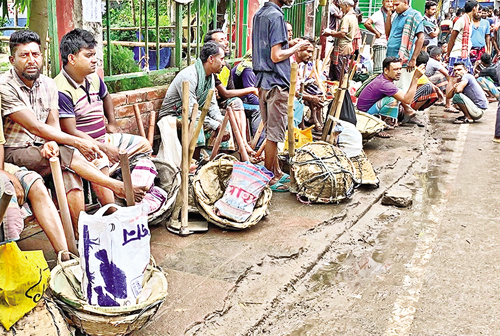
Published :
Updated :

When about 2.0 million people of a country fall below the poverty line in a year, it certainly points to that country's economic malaise. But if this follows the previous year's more than three million people's plunge into poverty with no projection of a turnaround in sight, the nation has reasons to be particularly alarmed. In this case, although fewer people in Bangladesh have become poorer in 2025 than those in 2024, it does not indicate that still fewer people will be poorer in 2026. The World Bank's latest report, "Bangladesh Poverty and Equity Assessment 2025" released on Tuesday last finds that the poverty rate is going up to 21.2 per cent in 2025 from 20.5 per cent in 2024. The projection is dire with 62 million tottering on the precipitous positions of vulnerability and slipping into poverty. Overall, more than one-third of the population is at risk.
The WB has pointed out that the macro-economy has worsened since 2023 and at the same time social inequality has yawned. Pitted against poverty rates of 2024 and 2025, the rise of the millionaires ---not referred to by the WB in the report---can make an interesting reading. In the eight to ten months before September last, this year, 10,980 new millionaires were created. Even in the politically tumultuous year 2024, the number of millionaire bank accounts of Tk10 million at the least increased by 5,173, of which 4,954 in the last quarter. It is also the time when1,657 millionaire accounts disappeared following Sheikh Hasina's exit.
So the macroeconomic deterioration may have its seeds hidden in factors not found in copybook economy. The explanation for the unresolved development miracle and social progress in Bangladesh lies in extra economic contexts. In a system that keeps avenues open to favoured elements for their move up the ladder, the poor and neglected have little opportunities, particularly when the accumulated money is either laundered or not in circulation or investment. The economy stagnates in such uncertain times. A decelerated growth is the outcome. This has exactly happened in case of Bangladesh. Thus the GDP growth at 6.0 per cent in 2023 is projected to plummet to just 4.0 per cent in 2025.
Although this country follows free-market open economy, essentially it does the opposite with the businesspeople calling the shot and the bureaucracy perpetuating its stranglehold on the broad spectra of important areas of national interests. It is the lesser mortals who have to suffer the most because they are voiceless. At a time when the public servants are going to have higher pay packages, the ordinary people are being deprived of not only the minimum basic income but are also finding themselves without employments. This is despite the historic lowest implementation of annual development programme (ADP). The systemic discrimination and disparity sink deep.
Now, these are known facts but what the less known but most important point is how to bring an end to the perpetually systemic arrangement for righting the wrong, allowing equal opportunity for all to move up the socio-economic ladder. This certainly calls for restraining the ballooning of profits and doing away with speed money or graft. When the educated and privileged from business circle and bureaucracy keep the infamous system running to their mutual benefit, the duty of dismantling the bastion falls on the shoulders of young blood. The July-August uprising presented a golden opportunity for the nation to create an exploitation-free society. But this has been squandered by those who were charged to oversee such a social transition.
Although the WB has mentioned the widening inequality in Bangladesh society, it is more a lip service than a serious commitment to uphold the virtue of narrowing down the existing disparities. Macroeconomic stability with trickle-down benefits for the deprived and marginal people would be enough to appease the Bretton Woods institutions like the WB and International Monetary Fund IMF). The archaic system in operation in countries like Bangladesh serves as a breeding ground for moneyed people---a class of oligarchs. Contrarily, the poor and marginal people are consigned to the vicious cycle of poverty. Projects such as social networks programmes may help keep the body and soul of the vulnerable people together but do not allow the new generation from such social settings to break the cycle to lead a dignified life.
When the market is monopolised for outrageous profits leading to high inflation, it is the poorer segments of society that are hit the hardest. Thus victims of river erosion and cyclone or floods are relegated to floating people and beggars in urban centres. But if the country could elevate itself to a welfare state, this kind of human tragedy could be avoided. Instead of giving rise to more crorepatis, a state welfare fund would have been created for rehabilitation of the victims of natural calamities. Even climate refugees could be given a better deal for their survival with dignity and a chance for their children to receive education for a livelihood option. There is no alternative to creating job opportunities for the unemployed multitudes.
Unless this yawning social divide can be bridged by some radical economic programmes with investment in human capital, lives and livelihoods of the extreme poor are not going to change for the better. But the transformation of the mindsets of the bureaucrats and political leaders ought to happen first in order to comprehensively change the social fabric. This is how the today's poor can be transformed into tomorrow's consumers, triggering the momentum of economic and social progress sustainably.


 For all latest news, follow The Financial Express Google News channel.
For all latest news, follow The Financial Express Google News channel.